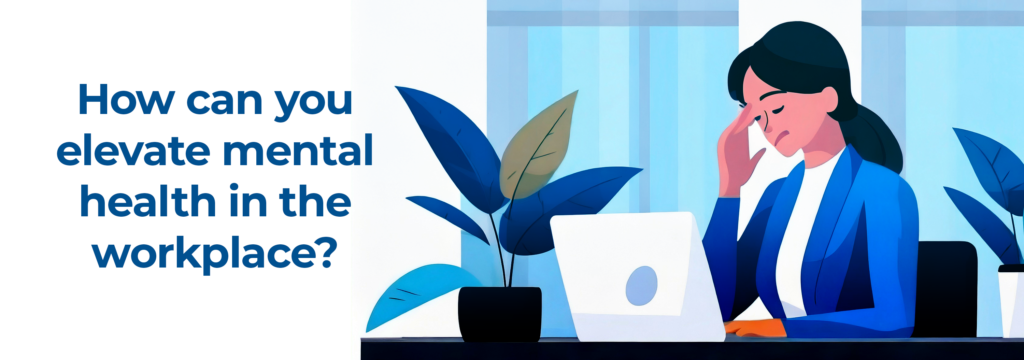The Proven Power of Prioritising Well-Being
Once, mental health was considered an unspoken subject in the workplace. Employers felt productivity would suffer if they focused on their workers’ mental health, so they prioritised output and efficiency over their employees’ well-being. However, there has been a significant shift in this mindset in recent years. Our state of mind can have a profound impact on how well we do our job and how we interact with others—and eventually, that can take a toll on the business as well:
-
-
- Depression and anxiety cost $1 trillion and resulted in 12 billion lost working days in 2022.
- 33% of mental health service users in New Zealand avoided applying for jobs due to stigma.
- Safe Work Australia reported a 3% increase in serious claims related to mental health conditions from 2014-15 to 2020-21.
- The average time lost in Australia rose from 18.8 weeks in 2016 to 30.7 in 2020.
- 3.4 million Australians sought mental health help in 2020.
- NZ$1.85 billion was lost due to work absence, with 22% of workers attending work while unwell in 2020.
- 64% of NZ organisations reported increased stress in 2020.
-
Stats from The World Health Organization, Mental Health Foundation NZ, Safe Work Australia, and The Australian Institute of Health and Welfare.
Research and real-world evidence show that employee well-being is inherently linked to productivity. Modern workplaces require strong mental functioning, including creativity and problem-solving abilities, all of which impact an employee’s mental health.
The Benefits of Prioritizing Employee Well-being
Studies have proven that prioritising employee mental health and well-being by creating a supportive work environment benefits companies tremendously:
-
-
- According to WHO, for every $1 put into mental health, there’s a return of $4 in improved health and productivity.
- American Psychological Association found that 89% of workers are more likely to recommend their company as a good place to work if they support well-being.
- The European Agency for Safety and Health at Work reports that companies focusing on mental health are in a better position to meet occupational health and safety regulations.
- The Corporate Executive Board found that organisations with a strong health and well-being culture are 3.5 times more likely to have good employee engagement and retention.
- A report by Gallup shows that organisations with higher employee engagement (which ties closely to well-being) have 59% less turnover.
- The Corporate Leadership Council found that engaged organisations grew profits as much as three times faster than their competitors.
-
These studies and data points underscore the significant impact of well-being initiatives on reducing absenteeism and turnover in the workplace. In fact, companies like Johnson & Johnson have reported that their wellness programs have saved the company $250 million on healthcare costs over a decade, with a return of $2.71 for every dollar spent. By investing in employee mental health and well-being, companies create a more supportive and productive work environment and reap financial benefits through reduced costs associated with absenteeism and turnover.
Companies can use many tools, such as Employee Assistance Programs (EAPs) or counselling services, as well as financial and physical health workshops. These are great ways of putting fences at the top of the cliff rather than an ambulance at the bottom—but if you want to help your staff avoid the cliff altogether, then you need to look into a well-being app.
Well-Being Apps
Adding a well-being feature that includes Cognitive Behavioural Therapy coaching can benefit both employers and employees, as it allows your staff to identify limiting beliefs early and challenge them. Limiting beliefs are ideas that we form during childhood or when we have an emotional experience that stick with us and affect how we think, feel and act. These beliefs are stored in our unconscious mind and can influence us throughout our lives. By recognizing and challenging these beliefs, we can discover the root of why we feel the way we do, and begin moving towards a healthier mindset.
Timecloud and ThinkLadder
To this end, we’re excited to announce Timecloud Well-being. By partnering with ThinkLadder, we now have a self-awareness app designed to help people understand their mental state better, provide employers with anonymised analytics that help understand challenges in the culture that may need addressing, and provide possible actions related specifically to issues arising.
The app encourages users to select a theme and symptom, explore potential unhelpful thoughts, and replace them with empowering alternatives. CBT is based on neuroplasticity—our brain’s ability to change. By repeatedly focusing on positive alternatives, users engage in self-directed neuroplasticity, fostering healthier thinking patterns. Through deliberate practice and repetition, users of the well-being app embark on a journey of self-directed neuroplasticity, shaping their brains for healthier thinking and feeling. The app cultivates a more supportive and productive mental landscape, one thought at a time.
Interested in learning more about how Timecloud can reduce stress for businesses? Reach out to our team today to discover how we can help.

